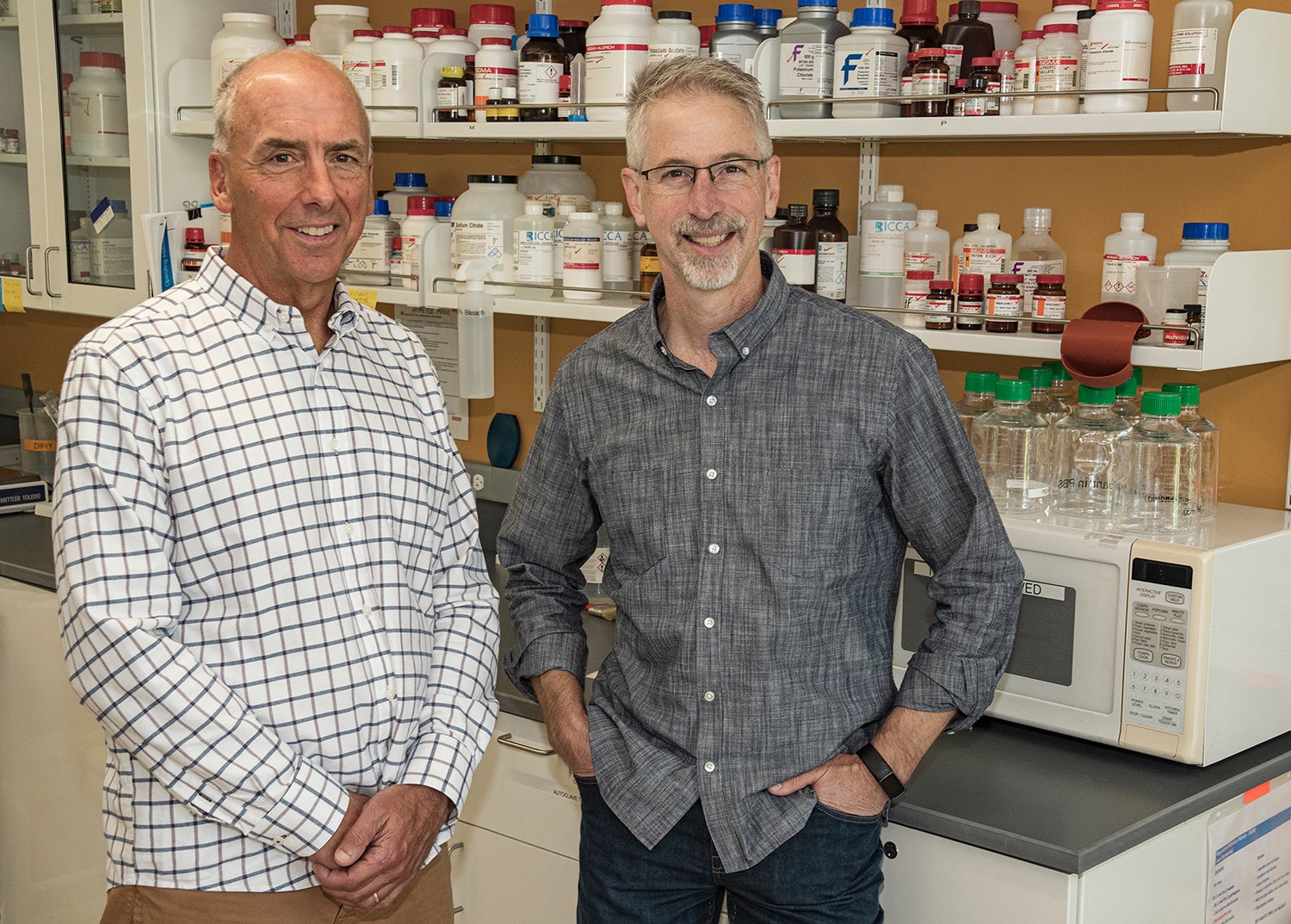KINGSTON, R.I. – Oct. 21, 2022 — William Van Nostrand and John Robinson, highly regarded for their contributions to neurodegenerative disease research, have been named co-executive directors of the George & Anne Ryan Institute for Neuroscience at the University of Rhode Island, President Marc Parlange announced today. With a shared vision for the institute’s future, Van Nostrand and Robinson bring a complementary approach to leadership that reflects the successful partnership they have honed during decades of research collaboration.
When Van Nostrand and Robinson answered the call to serve as co-directors of the institute in 2020, the longtime research collaborators did not envision themselves in the roles long term—only long enough to guide the institute during a search for a new executive director. But two heads have proven to be better than one. As co-directors, they not only provided seamless stability through pandemic challenges, but also have moved the institute significantly forward in its research capacity and goals since taking on the roles.
Following an extensive national search, which generated interest from an impressive group of candidates, the selection committee determined that none matched the level of expertise and commitment that Van Nostrand and Robinson bring to the institute.
“What John and Bill have accomplished since joining URI, and particularly in the past two years, is truly remarkable,” said Parlange. “I am confident that, under their leadership, the Ryan Institute and the University are poised for preeminence in the study, prevention, treatment, and, perhaps one day soon, eradication of neurodegenerative disease.”
The Ryan Institute was founded in 2013 with a milestone $15 million gift from Tom and Cathy Ryan and an ambitious mission to treat and prevent Alzheimer’s disease and other neurodegenerative disorders. Van Nostrand and Robinson, who came to URI in 2016 from Stony Brook University, were inspired to make the move to Kingston after seeing the institute’s potential and a closely connected community at URI.
“The focus and vision for the institute strongly appealed to us,” said Van Nostrand, also Herrmann Professor of Neuroscience and a professor of biomedical and pharmaceutical sciences in the College of Pharmacy. “We hadn’t been looking to move, but we were both drawn to the opportunity to be part of something special and help build something new.”
Van Nostrand is considered one of the field’s foremost researchers in cerebral amyloid angiopathy, a condition that commonly occurs with Alzheimer’s disease and holds important clues about the role of brain blood vessels in Alzheimer’s disease and related disorders. Robinson, who holds joint appointments as a professor of psychology in the College of Health Sciences and of biomedical and pharmaceutical sciences in the College of Pharmacy, is a noted behavioral neuroscientist specializing in the use of rodent models to understand nervous system dysfunction and disease. Their work together has helped break new ground in the study of lifestyle factors that may contribute to Alzheimer’s disease and other dementias––a combined expertise that establishes a distinct niche for URI among research institutions.
“John and Bill are talented neuroscience researchers,” said Interim Provost Laura Beauvais. “They are committed to the vision of the Ryan Institute and, along with the early-career faculty they have mentored, have had great success in obtaining external funding to support this research. I have absolute confidence in their leadership, and I look forward to continuing to work with them as they grow the institute.”
The institute also includes a dedicated core faculty whose work investigates under-explored yet critical factors in neurodegenerative disease pathology, as well as an affiliated network of URI faculty with shared research interests. In collaboration with URI’s Interdisciplinary Neuroscience Program and partners such as MindImmune Therapeutics, Inc.––a public-private Alzheimer’s disease drug discovery start-up based at URI—the Ryan Institute is part of a vibrant and fast-growing neuroscience community on campus.
“We are both enthusiastic about working with leadership to continue to advance the mission of the institute and expand its reach and impact,” said Robinson. “The institute has made great gains since its start, and we’re eager to leverage those strengths as we begin the next chapter.”

